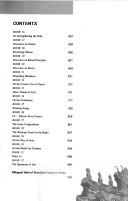
Memes
 The Noble Person Keeps Their Mind in Virtue
The Noble Person Keeps Their Mind in Virtue
?????????????????????????????????????????????????????????????????????????????????????????????????????????????????????????????????????????????????????????????????????????????????????????????????????[Translated] The noble person knows that what is not complete or what is not pure is unworthy to be called beautiful. Therefore he recites and reiterates so as to integrate it, reflects and ponders so as to comprehend it, determines his associations so that he may dwell in it, and eliminates what is harmful in order to preserve and nourish it. He causes his eyes to be devoid of any desire to see what is not right, his ears to be devoid of any desire to hear what is not right, his mouth to be devoid of any desire to say what is not right, and his mind to be devoid of any desire to think what is not right. Having arrived at this, he takes utmost pleasure in it. His eyes will take greater pleasure in it than in the five colors; his ears will take greater pleasure in it than in the five sounds; his mouth will take greater pleasure in it than in the five flavors; and his mind will benefit more from it than from possession of the world. Therefore he cannot be subverted by power or profit, nor swayed by the masses and multitudes, nor unsettled by the whole world. He follows this in life; he follows it in death — this is what is called holding firm to inner power. He who holds firm to inner power is able to order himself; being able to order himself, he can then respond to others. He who is able to order himself and respond to others is called the complete man. Heaven manifests itself in its brightness; earth manifests itself in its breadth; the noble person values his completeness.
 The Noble Person is Like an Echo
The Noble Person is Like an Echo
???????????????????????????????????????????????????????????????????????????????????????????????????????????????????????????????????????????????[Translated] The learning of the noble person enters his ear, is stored in his mind, spreads through his four limbs, and is made visible in his activity and his tranquility. In his smallest word, in his slightest movement, in everything, he may be taken as a model and a standard. The learning of the lesser man enters his ear and comes out his mouth. With only four inches between ear and mouth, how can he possess it long enough to beautify a seven-foot body In antiquity learning was carried on for the sake of one’s self; today learning is carried on for the sake of others.The learning of the noble person is for the sake of beautifying himself; the learning of the lesser man is offering bird and beast [to win attention from others]. Thus to proffer information when you have not been asked for it is called officiousness; to proffer information on two questions when you have only been asked about one is garrulity. Officiousness is to be condemned, so too is garrulity. The noble person is like an echo.
 Intellectuals Must Craft Their Minds Through Study
Intellectuals Must Craft Their Minds Through Study
?????????????????????????????????????????????????????????????????????????????????????????????????[Translated] The noble person says: Learning must never cease. Blue comes from the indigo plant, yet it is bluer than indigo. Ice is made from water, yet it is colder than water. Wood as straight as a plumb line may be bent into a wheel that is as round as if it were drawn with a compass, and, even after the wood has dried, it will not straighten out again because this is the way it has been bent. Thus wood marked by the plumb line will become straight, and metal that is put to the whetstone will become sharp. The noble person who studies widely and examines himself each day will become clear in his knowing and faultless in his conduct.
 Study is More Efficient Than Contemplation
Study is More Efficient Than Contemplation
????????????????????????????????????????????????????????????????????????????????????????????????????????????[Translated] Once I spent an entire day in thought, but it was not as good as a moment of study. Once I stood on tiptoe to gaze into the distance, but it was not as good as climbing to a high place to get a broad view. Climbing to a high place and waving will not make your arm any longer, but you can be seen from farther away. Shouting down the wind will give your voice no added urgency, but you can be heard more distinctly. By borrowing a horse and carriage you will not improve your feet, but you can cover a thousand li. By borrowing a boat and paddles you will not improve your ability in water, but you can cross rivers and seas. The noble person is by birth no different from others, but he is good at borrowing from external things.




